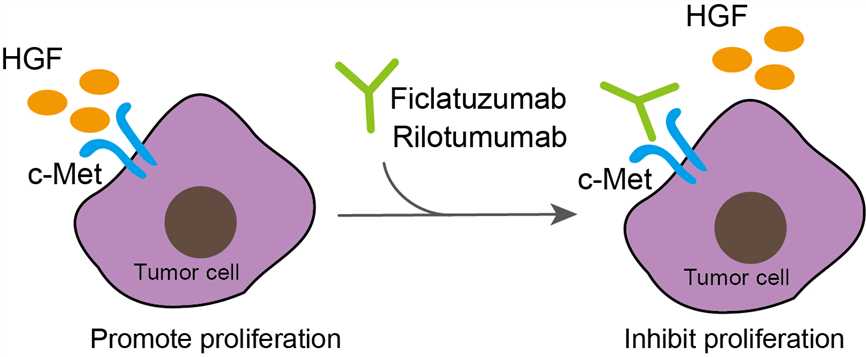Ficlatuzumab Overview
Introduction of Ficlatuzumab
Ficlatuzumab is an antibody with tumor therapeutic activity, targeting Hepatocyte growth factor (HGF). It has been studied in many cancer models. Ficlatuzumab has been used in trials studying the treatment of acute myeloid leukemia, non-small cell lung cancer, mullerian mixed tumor of ovary, relapsed acute myeloid leukemia, and refractory acute myeloid leukemia. The safety, tolerance, pharmacodynamics, pharmacokinetics and antitumor activity of Ficlatuzumab as a single drug in patients with advanced solid tumor and liver metastasis were evaluated. It was found that ficlatuzumab had good safety / tolerance and the recommended dose of the drug was obtained. At the same time, similar studies have been carried out in refractory advanced solid tumors and multiple myeloma. Ficlatuzumab was also used to study the therapeutic effect of tumor-associated fibroblasts on head and neck cancer and found that it can reduce the proliferation, migration and invasion of HNSCC. Recently, ficlatuzumab combined with gefitinib was used in a phase 1b trial of advanced non-small cell lung cancer (NSCLC), which found that the drug showed dose-dependent antitumor activity.
Mechanism of Action of Ficlatuzumab
Ficlatuzumab is a humanized antibody targeting HGF, and can bind to ligand of HGF with high affinity. HGF was discovered as a substance that can stimulate the proliferation of hepatocytes. Later, it was found that HGF can also act on epithelial cells, hematopoietic cells, vascular endothelial cells and other cells. It is a kind of multifunction factor which can regulate the growth, movement and morphogenesis of many kinds of cells. HGF plays an important role in embryogenesis, wound healing, angiogenesis, tissue and organ regeneration, morphogenesis and carcinogenesis through paracrine or autocrine mechanism and epithelial-interstitial interaction. It has been found that HGF can promote the proliferation of vascular endothelial cells and neovascularization, promote the generation, survival and regeneration of tissue cells, inhibit cell apoptosis, and regulate the synthesis of collagen fibers and inflammatory response. HGF-related cancers include lung, pancreatic, thyroid, colon and breast cancers. HGF regulates cell growth, cell motility and morphogenesis by activating tyrosine kinase signaling cascades after binding to proto-oncogene c-Met receptors. C-Met, a protein encoded by the proto-oncogene c-Met, has the activity of ammonia kinase, and its abnormal expression is closely related to the carcinogenesis and development of lung cancer. When HGF binds to its c-Met receptor, it activates the activity of c-Met tyrosine kinase, which can promote the proliferation, angiogenesis, invasion and migration of many kinds of tumor cells, including lung cancer cells. The interaction (cross-talk) of the HGF/c-Met signaling pathway with other pathways, such as VEGFR, affects the effect of antineoplastic drugs on the development of drug resistance. Targeted therapy of HGF/c-Met signal transduction pathway is a new hot spot in the treatment of lung cancer. Ficlatuzumab is one of the drugs targeted HGF with potential antineoplastic activity. The binding of ficlatuzumab to the soluble ligand HGF, blocks the interaction of HGF to its receptor c-Met, and inhibits the activation of the HGF/c-Met signaling pathway, which may result in cell death in c-Met-expressing tumor cells.

Fig 1. Mechanism of Action of Ficlatuzumab
For research use only. Not intended for any clinical use.
This site is protected by reCAPTCHA and the Google Privacy Policy and Terms of Service apply.

